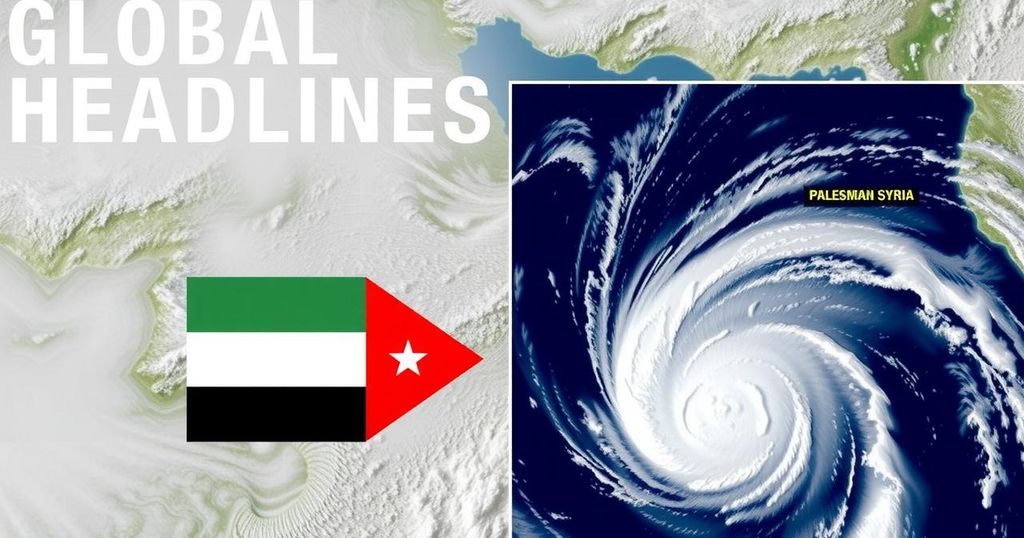Global Humanitarian Updates: Ukraine, Gaza, Syria, and Tropical Cyclone Dikeledi

Recent humanitarian updates indicate urgent situations in Ukraine due to ongoing conflict, a worsening humanitarian crisis in the Occupied Palestinian Territory, persistent challenges in Syria, and the aftermath of Tropical Cyclone Dikeledi in southeastern Africa, demanding immediate international support and assistance.
In the latest humanitarian updates, significant developments have been reported concerning several critical global issues: the ongoing situation in Ukraine, the humanitarian crisis in the Occupied Palestinian Territory, the conditions in Syria, and the aftermath of Tropical Cyclone Dikeledi in southeastern Africa.
In Ukraine, Under-Secretary-General for Humanitarian Affairs, Tom Fletcher, is visiting various sites where ongoing hostilities are affecting civilians. His recent visit to Zaporizhzhia included discussions with local authorities and inspecting a missile-struck medical clinic and an underground educational facility. Fletcher has also been to Dnipro, a collective site for displaced individuals, and the front-line area in Donetsk, where he emphasized the role of aid organizations in supporting local communities. A significant announcement concerning humanitarian and refugee response plans for the region is expected this week.
Meanwhile, the humanitarian situation in the Occupied Palestinian Territory worsens as OCHA reports that only a fraction of UN-led humanitarian movements are being facilitated by Israeli authorities amid ongoing hostilities. Thousands of civilians are displaced as evacuation orders are issued. The Humanitarian Coordinator for the region, Muhannad Hadi, visited displaced persons in Gaza, reaffirming the necessity of protecting areas of refuge amidst the continuing conflict.
In Syria, efforts to provide humanitarian aid persist despite a complex security landscape. Notably, a cholera vaccination campaign initiated by the WHO recently concluded successfully. However, challenges such as water shortages in various regions remain prevalent, affecting hundreds of thousands of citizens.
In southeastern Africa, following the destructive impact of Tropical Cyclone Dikeledi, humanitarian partners are mobilizing to assist those affected, particularly in Madagascar and Mozambique. Initial reports indicate fatalities and substantial displacements. Response efforts, including the distribution of water and hygiene kits, are well underway to aid over 400,000 individuals impacted by Cyclone Chido and Dikeledi.
The current global humanitarian crises underscore the urgent need for coordinated international response and assistance. The war in Ukraine continues to cause significant civilian hardships, prompting the UN to step directly into the response efforts. In Gaza, the humanitarian situation has reached a critical point as OCHA highlights the impediments to aid delivery, further exacerbated by an ongoing military conflict. Syria remains in turmoil with ongoing security issues, complicating the delivery of essential health services and humanitarian aid. Moreover, natural disasters like Tropical Cyclone Dikeledi illustrate the vulnerabilities faced by populations in South-East Africa, necessitating swift humanitarian assistance and sustained support for recovery and resilience. Such global challenges reflect the intertwined nature of conflict, natural disasters, and humanitarian needs.
The latest updates on humanitarian crises worldwide reveal a dire need for immediate and effective international response. In Ukraine, the situation calls for enhanced support for civilians amid ongoing conflicts. The humanitarian catastrophe in Gaza requires urgent attention and safe access for aid delivery. Meanwhile, Syria continues to grapple with both conflict and health crises, and the impacts of Tropical Cyclone Dikeledi highlight the vulnerability of affected populations in southeastern Africa. These crises necessitate a multifaceted response from global humanitarian partners to alleviate suffering and support recovery.
Original Source: www.unocha.org








